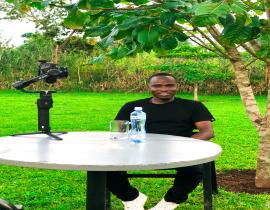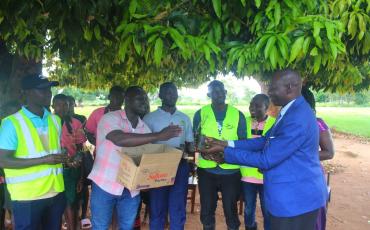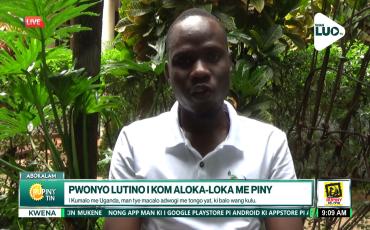
Story about the Founder/CEO of Climact Africa (Opio Joseph)
Growing up in Eastern Uganda, where agriculture is the primary source of livelihood for most households, I developed a deep interest in addressing the pressing issues of climate change. In the early 2000s, the Lord’s Resistance Army (LRA) insurgency severely affected both Eastern and Northern Uganda. The conflict caused widespread displacement, loss of life and major setbacks in agriculture, plunging many communities into poverty.
In the aftermath, many communities resorted to cutting down trees to meet basic needs; for charcoal, firewood, settlement expansion, farming and infrastructure development such as roads. While these actions were often necessary for survival, they have greatly contributed to environmental degradation and global warming, resulting in long-term adverse effects.
Today, climate change has drastically altered weather patterns, particularly in the north-eastern region. The area now faces prolonged droughts and erratic rainfall. Rainy seasons have become increasingly unpredictable and shorter, reducing the length of growing seasons and lowering crop yields. Extreme weather events especially droughts and floods have become more frequent and severe, leading to crop failure, increased plant diseases and declining food security.
The consequences go beyond agriculture. Climate change has also driven up the incidence of water-borne diseases such as cholera, dysentery and hepatitis E; vector-borne diseases like malaria; respiratory infections; and malnutrition-related conditions. Soil degradation caused by deforestation and flooding has further worsened agricultural productivity, threatening health, incomes and livelihoods.
As an animal scientist, I have closely studied and observed the complex interactions between humans, livestock and the environment. Poor grazing practices, overstocking and land-use conflicts often result in soil erosion, deforestation and water resource depletion. These interactions, if not well-managed, significantly accelerate environmental degradation.
To deepen my understanding and strengthen my ability to develop sustainable solutions, I am currently pursuing a Master of Science in Environmental Science and Natural Resources Management. This program has broadened my knowledge in climate adaptation, ecological restoration, and sustainable resource use, enhancing my ability to support community-driven environmental conservation initiatives.
In addition to my academic background, my experience working as a Personal Banker – Agriculture at Centenary Bank has given me valuable exposure to the realities faced by farming communities. Through constant interaction with farmers, I have witnessed the environmental risks associated with agriculture such as changing rainfall patterns, soil exhaustion and pest outbreaks as well as the financial and operational challenges that undermine agricultural productivity. This role deepened my appreciation of the link between environmental sustainability, rural livelihoods and community resilience.
I intend to leverage the Climact Africa platform to contribute practical, science-based solutions to environmental challenges resulting from the human-livestock-environment interface. Through education, research, sustainable land management and community engagement, I hope to promote more resilient agricultural systems and encourage the adoption of climate-smart practices across Uganda and beyond.
One of our ongoing efforts includes tree planting in Paicho, Gulu District, in collaboration with local village leaders. We plan to expand this initiative to other areas, focusing on both environmental restoration and community sensitization.
A major challenge remains the widespread lack of awareness among rural populations about environmental conservation. This underscores the urgent need for education on the causes and consequences of environmental degradation, especially deforestation and unsustainable livestock practices.
I firmly believe that with unity and collective action, we can make meaningful progress. As it is written, “The Lord God took the man and put him in the Garden of Eden to work it and take care of it” (Genesis 2:15). As stewards of the Earth, we are entrusted with the responsibility to protect and preserve it for ourselves and for generations to come.





